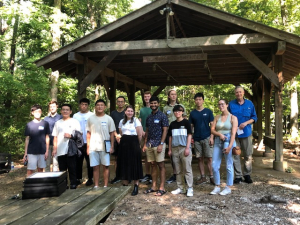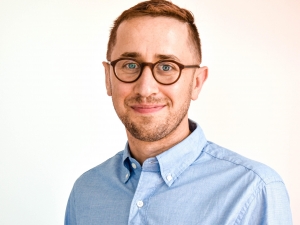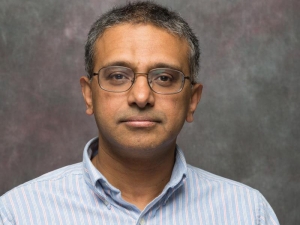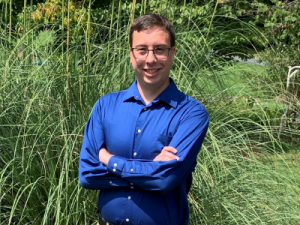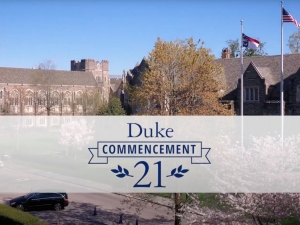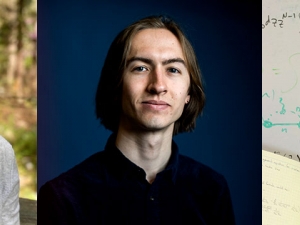Imagine taking a snapshot of the Big Bang with a computer chip. Ashutosh Kotwal, Fritz London Professor of Physics at Duke University, thinks we may have a first step in that direction. In a paper published last week in the journal Nature Scientific Reports, Kotwal melds two fascinating ideas from technology and physics - the use of artificial intelligence and machine learning for image recognition and the search for dark matter, the mysterious stuff that makes up 84% of the total amount of matter in the universe.… read more about Capturing secrets of the Universe on a silicon chip »
When a lab is shut down, something big has ended. A cycle of activity has ceased. Some cycles end abruptly while others reach slow and carefully-orchestrated conclusions. In the case of the Behringer Lab, both types of endings were simultaneously true. On July 10, 2018, Duke lowered its flags to mark the passing of Robert Behringer, James B. Duke Professor of Physics. Behringer was an active researcher, with a lab full of graduate students and postdoctoral researchers. Three years later, the last of his graduate students,… read more about Closing the Door on the Behringer Lab »
Applying to graduate school can be a confusing and intimidating process. Come join current Physics Graduate students for a chat and a Q&A aimed at demystifying the graduate school application process. Open to all undergraduates interested in physics graduate school! When: SEPTEMBER 23 | 5PM-6:30PM Where: LSRC A155 Hosted by the Duke Physics Students Society For questions email Elliott Kauffman (emk50@duke.edu) or Henry Burns (hab22@duke.edu) read more about Understanding the Grad School Application Process »
The recently established Advanced Light Imaging and Spectroscopy (ALIS) facility is now officially a service center and we're here to help with your custom optical microscopy needs. In celebration of the inauguration, ALIS and the Duke Light Microscopy Core Facility LMCF are organizing a seminar series on Advanced Optical Imaging Technology. There will be lectures on the technologies and applications, with a keynote lecture on lattice light sheet from Wes Legant from UNC.… read more about New Core Facility: ALIS! »
Every year, at the start of the Fall semester, the Physics department announces its internal awards and fellowships, and gathers to celebrate with faculty and students. This year the Annual Welcome Picnic took place at the Duke Forest, and was attended by over 130 people. Awards These are the Academic Year 2020-2021Physics Awardees: American Association of Physics Teachers (AAPT)'s Outstanding Teaching Assistant Award Ryan Bouabid James Wheeler Duke Physics Mary Creason Memorial Award for… read more about Congratulations 2021 Graduate Fellowship Winners! »
The National Science Foundation has awarded a five-year, $20 million grant to Duke University researchers to explore and optimize the chemical structure and physical properties of individual molecules in a polymer network. “The long-term potential of this research includes cost- and time-efficient optimization of the polymers used in products like biomedical implants, building materials and even automobile tires,” said principal investigator Stephen Craig, the William T. Miller distinguished professor of chemistry at Duke… read more about NSF Creates Polymer Chemistry Optimization Center at Duke for Future Materials »
Iman Marvian, assistant professor of Electrical and Computer Engineering and Physics at Duke University, has been awarded a prestigious National Science Foundation Faculty Early Career Development (CAREER) Award. The award supports outstanding young faculty members in their efforts to build a successful research enterprise For the next five years, the $510,000 award will support Marvian’s efforts in Quantum Information Science to use insights gained from developing models for quantum computing algorithms and quantum… read more about Marvian Wins National Science Foundation CAREER Award »
Ayana Arce studies quarks, which involves colliding atoms at high speeds and watching those constituent particles come into focus. But a recent collaboration between the associate professor of Physics and a visual artist is making vital human bonds visible instead. Arce’s research is the inspiration behind “We Contain Multitudes,” a new mural in northeast Washington, D.C., depicting quarks artistically as creative, resilient and interconnected women. It’s the second piece in a public art series by Amanda Phingbodhipakkiya… read more about Duke Physicist’s Work Inspires Washington D.C. Mural »
When he was an undergraduate political science student, Kerry Haynie was never taught about the 1921 Tulsa massacre. Nor was there much discussion about the role of race in the founding political documents of this country or much examination of how race influenced public services such as sewer lines and zoning.In one sense, a lot has changed. In 2021, Duke’s faculty includes a strong lineup of leading scholars who examine how race is embedded in issues that cross all the schools of the university. This fall, many of these… read more about University Course Raises Race as a Central Element of Undergraduate Education »
Duke’s Michael Troxel explains what millions of galaxies can teach us about dark energy and the ever-expanding cosmos. read more about Mapping the Invisible Universe »
A Duke physicist is among those to receive an Early Career Research Program Award this year from the U.S. Department of Energy, the government agency announced May 27. Assistant Professor of Physics Dan Scolnic studies cosmology and is particularly focused on new image analysis techniques and finding optical counterparts to gravitational waves. The research topic he submitting for the DOE award was titled “Reducing Top Systematic Uncertainties in Cosmological Analyses with Type Ia Supernovae and Contaminated Photometric… read more about Scolnic Earns DOE Early Career Research Program Award »
Congratulations to Prof. Iman Marvian on his CAREER Award from the National Science Foundation. The title of his project is "Applications of Quantum Information Theory and Symmetry Principles in Quantum Physics". See NSF's announcement here. read more about Prof. Marvian Receives NSF CAREER Award »
Congratulations to Prof. Dan Scolnic on receiving an Early Career Research Program award from the Department of Energy's Office of Science. His research topic was "Reducing Top Systematic Uncertainties in Cosmological Analyses with Type Ia Supernovae and Contaminated Photometric Samples". read more about Prof. Scolnic Receives DOE Early Career Award »
Long ago Feynman had a vision that we could one day study our favorite quantum system using quantum computers (see here). With the advent of quantum computing, this vision is moving closer into the realm of reality. One may even go one step further and imagine that nature, at the fundamental level, can be constructed as a model constructed with qubits. Quantum field theorists have been exploring this possibility for many years. One fundamental bottleneck has been to achieve asymptotic freedom in the language of qubits… read more about Constructing Nature with Qubits »
May 6, 2021 Update: Jonathon Yuly and his co-authors, including Peng Zhang and David Beratan, were awarded Proceedings of the National Academy of Sciences's 2020 Cozzarelli Prize for their paper on electron bifurcation. The award is given annually to six research teams whose articles have made "outstanding contributions to their fields." You can hear Yuly describe the paper in the video above or in an episode of PNAS's Science… read more about Grad Student Jonathon Yuly wins Cozzarelli Prize »
Please join us in congratulating all of our fabulous graduates on the completion of their degrees and their accomplishments! Due to the pandemic, we were not allowed to have an in-person event. In order to recognize our graduates a video was recorded that can be accessed on our departmental homepage and on YouTube here. We wish our graduates all the very best for their future endeavors – we are proud of what they have accomplished and we are excited to learn about their future accomplishments. Please keep in touch with… read more about Congratulations, 2021 Graduates! »
Undergraduate alum Katrina Miller ('16), now a graduate student at the University of Chicago, has received a Mass Media Science and Engineering Fellowship from the American Association for the Advancement of Science (AAAS). Her fellowship host is WIRED Magazine where she will be working this summer. Click here to read her statement about the opportunity. Congratulations, Katrina! read more about Alum Miller to Work at WIRED Magazine on Summer Fellowship »
Congratulations to three winners of the prestigious National Science Foundation's Graduate Fellowship competition in 2021. They are: Katherine Parham, a current second year student working on proton spin structure with Prof. Anselm Vossen; Jameson Patrick O'Reilly, a second year transfer from the University of Maryland who will be joining us in Fall 2021, working on entanglement in quantum networks with Prof. Christopher Monroe… read more about Congratulations to three Duke Physics recipients of the NSF Graduate Fellowship in 2021! »
Graduate student Tyler Johnson received the award for "Best Talk" at the annual meeting for the Consortium for Monitoring, Technology and Verification for his presentation on “Neutron Induced Fission”. Click here to view the announcement on MTV's page and you can view Johnson's recording on YouTube here. Congratulations! read more about Grad Student Johnson Awarded Best Talk »
Henry Newson Professor of Physics Haiyan Gao has been named the next Associate Laboratory Director for Nuclear and Particle Physics at Brookhaven National Laboratory, according to a March 30 announcement from the research center. Brookhaven is home to one of the world’s largest existing particle accelerators, the Relativistic Heavy Ion Collider, and also hosts the brightest x-ray synchrotron in the world. Research conducted at Brookhaven has had impacts in fields ranging from physics and materials to biology and medicine… read more about Duke Physicist to Again Lead Premier National Lab »
All four Duke University undergraduates nominated for the Barry M. Goldwater Scholarship have won the federally endowed award that encourages students to pursue careers in the fields of mathematics, natural sciences and engineering.Yasa Baig, John Boom, Grace Dessert and Anish Karpurapu are among the 410 students awarded Goldwater Scholarships on March 26 for the 2021-2022 academic year. The Goldwater Scholars were chosen on the basis of academic merit from a pool of 1,256 natural science,… read more about Four Duke Juniors Named National Goldwater Scholars »
The Office for Faculty Advancement has awarded seed grants to 14 faculty-led projects exploring new ideas and expanding existing initiatives to promote an equitable and inclusive academic environment at Duke. The theme for this cycle was "Confronting Racism and Bias: Fostering an Inclusive Community." Faculty Advancement Seed Grants provide a financial head start for novel faculty development initiatives within academic units.2021-22 Faculty Advancement Seed GrantsArt, Art History and Visual Studies Anti-Racist Pedagogy… read more about Seed Grants Help Faculty Lead the Way in Confronting Racism and Bias »








